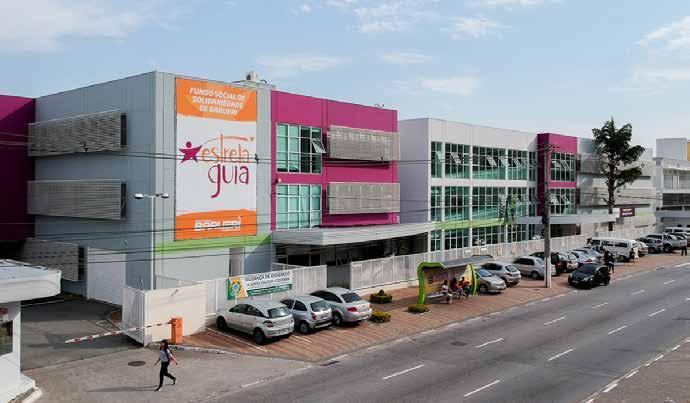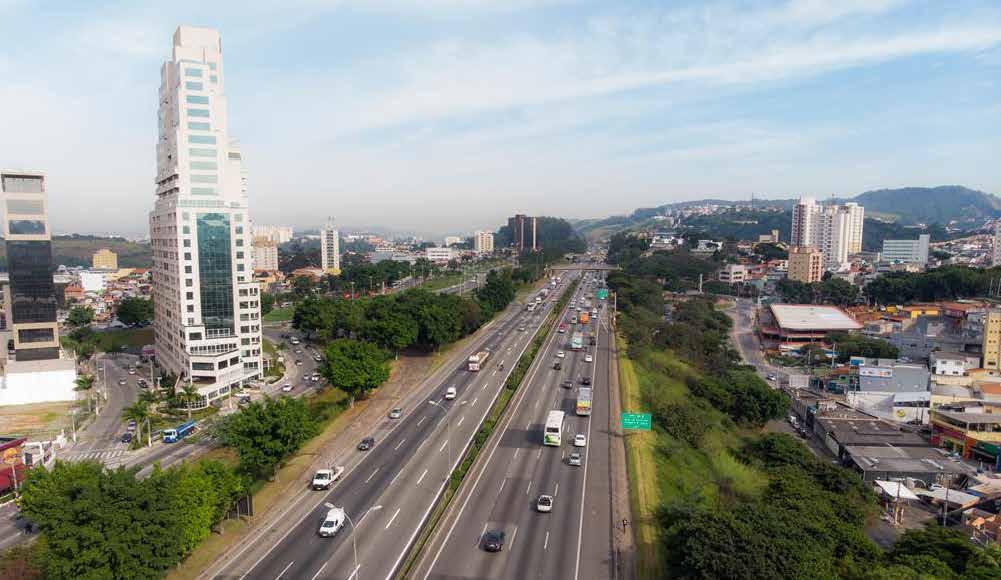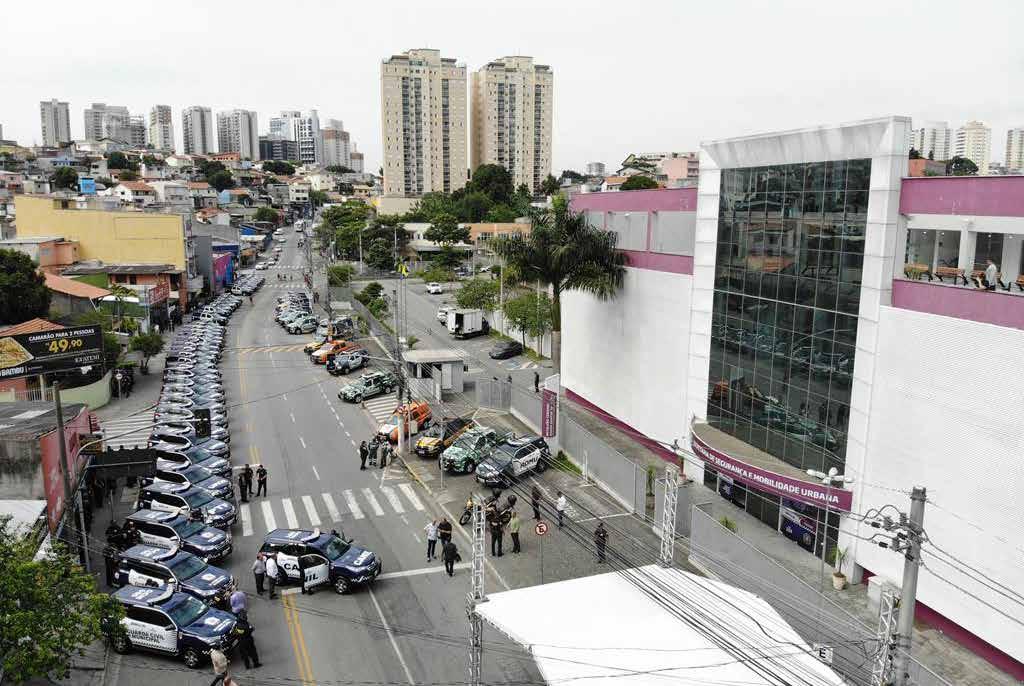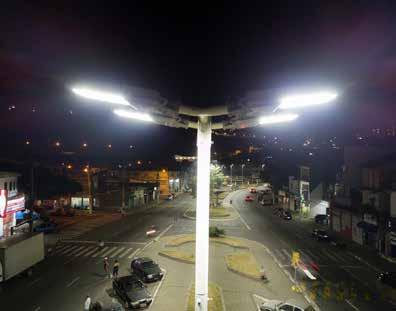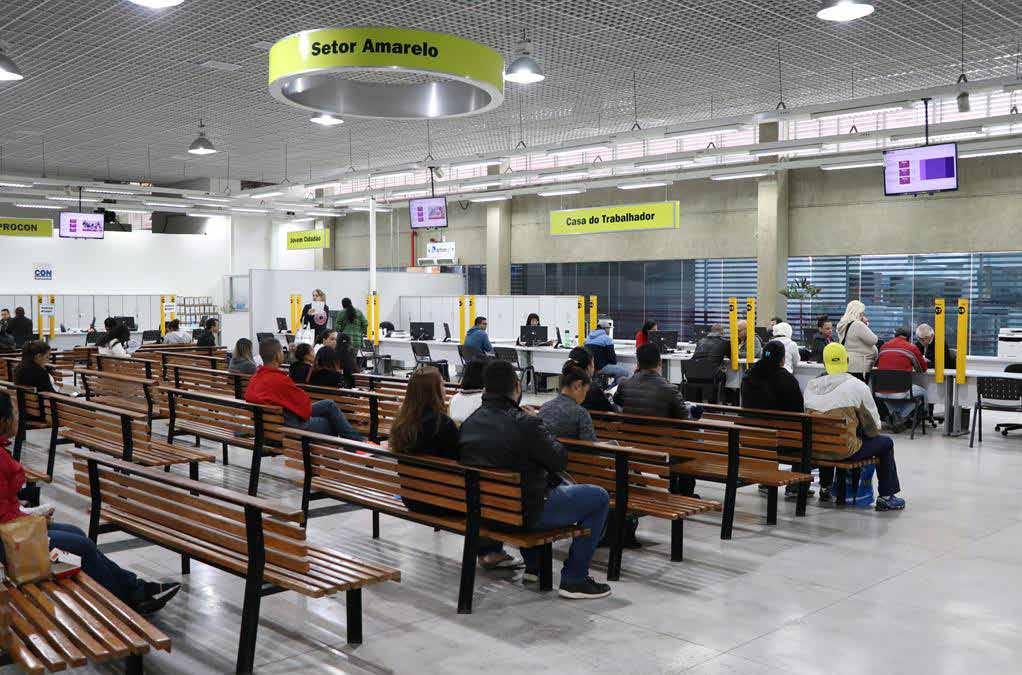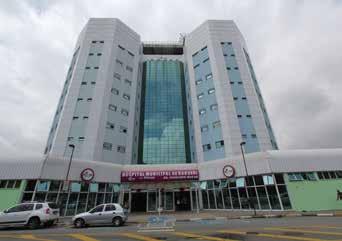
10 minute read
MAYOR S PROfILE
Mayor Rubens Furlan
Rubens Furlan was born in Sorocaba-SP on December 12, 1952. He is a Brazilian politician, trained in law and currently the mayor of Barueri. Furlan is married to Sônia Dias Furlan and father of four children, Priscila Furlan, Rubens Furlan Junior, Felipe Furlan and federal deputy Bruna Furlan.
Advertisement
Political Career
• Barueri City Counselor (1977-1982) • President of the City Counselor’s Chamber of Barueri from 1979 to 1981 • Mayor of Barueri (1983-1988, 1993-1996, 2005-2008, 2009-2012, 2017-2020) • State Congressman (1991-1992) • Federal Congressman (1998-2002)
Biography
By the age of 10, Rubens Furlan was already an early political agent. Always associated to politics, as a child, he was in charge of the delivery of newspapers in Sorocaba-SP with his brother. On Sundays, Furlan left to deliver the last copy to Mayor Artidoro Mascarenhas, also known as Doctor Pitoco, who always offered him an orange juice and invited him to talk. In these meetings, Rubens made a point of reporting what the people were saying about his performance.
As a young man, already in Barueri, he participated actively in meetings of the Brazilian Democratic Movement (MDB - before know as PMDB), occasions that allowed the assimilation of political oratory, improved over time. The plunge into political life, however, was thanks to the encouragement of Mother Beatrice in 1976. “Why don’t you run for councilman?” She asked. This simple question was enough for Rubens to start looking for support from prestigious politicians at the time. And it was in the former councilor, former mayor and favorite for the municipal elections that year Arnaldo Rodrigues Bittencourt, that the young man found space to run for councilman by the MDB - resulting in the most voted councilman. From then on, his public life began to take shape.
Two years later, Rubens Furlan took over the presidency of the town hall, replacing Wagih Sales Nemer, who had supported the candidacy and became a true friend who, sixteen years later, would become his deputy mayor. In 1982, Furlan’s words came true. He was declared mayor by the MDB after eight days of polling at the polls. He marries four days later with Sonia Furlan, his current wife.
Two years after the end of his first term as mayor, in 1990, Rubens Furlan is confirmed as the fourth most voted state legislator in the state, gathering votes in cities like Carapicuiba, Jandira, Santos, São Vicente, Itu, among others. At this time, Furlan supported the candidacy of Luiz Antonio Fleury Filho, who became governor of the state and went on to visit the Furlan couple frequently in their new residence in Jardim Belval. In his second term, also taken over by the MDB in 1993, Rubens Furlan transformed Barueri into a real construction site: he created the Municipal Civil Guard, continued the fight to combat flooding with the blocking of parts of the Barueri-Mirim river, delivered 736 apartments of the Housing Set of Jardim Paulista, just to name a few. In 1998, Rubens ran for the Federal Deputy and won the third largest vote among the seventy federal deputies from São Paulo state.
Rubens Furlan positioned Barueri as one of the five largest economies in the state, the leader in job creation and the city that receives the most industrial investments in the region. Barueri is one of eight cities in the state of São Paulo with excellent indications of wealth, longevity and schooling, with approximately 37 thousand national and multinational companies. In 2009, Barueri adopted the city of Berilo, in the Jequitinhonha Valley, for the third edition of “Barueri, Sou do Bem”, coordinated by Sônia Furlan.
At the end of 2016, Rubens Furlan (PSDB) was elected to his fifth term as mayor of Barueri-SP, for the next four years. With 100% of the polls cleared, Furlan had 143,250 votes, which corresponds to 84.73% of the votes valid for the dispute.
Alcalde Rubens furlan
Rubens Furlan nació en Sorocaba-SP, el 12 de diciembre de 1952. Es un político brasileño, graduado en derecho y actualmente alcalde de Baruerí. Furlan es casado con Sonia Dias Furlan y padre de cuatro niños, Priscila Furlan, Rubens Furlan Junior, Felipe Furlan y la diputada federal Bruna Furlan.
Carrera política
• Edil de Baruerí (1977-1982) • Presidente de la Cámara de Baruerí de 1979 a 1981 • Alcalde de Baruerí (1983-1988, 1993-1996, 2005-2008, 2009-2012, 2017-2020) • Diputado provincial (1991-1992) • Diputado federal (1998-2002)
Biografía
A los 10 años Rubens Furlan ya se mostraba un agente político precoz. Siempre conectado a la política, cuando niño era encargado, con el hermano, de la entrega de periódicos en Sorocaba-SP. Los domingos, Furlan dejaba para entregar el último diario al alcalde Artidoro Mascarenhas, también conocido como Doctor Pitoco, que siempre le ofrecía un jugo de naranja y lo invitaba a charlar. En estos encuentros, Rubens se empeñaba en la cuestión de lo que el pueblo comentaba sobre su actuación.
Cuando joven, ya en Baruerí, participaba activamente de reuniones del Movimiento Democrático Brasileño – MDB, ocasiones que permitieron la asimilación de la oratoria política, perfeccionada a lo largo del tiempo. Su entrada en la vida política, entretanto, se dio gracias al incentivo de la madre Beatriz en 1976. ¿“Porque no te candidatas a edil?”, le preguntó ella. Bastó esta simple pregunta para que Rubens comenzara a buscar respaldo de políticos de prestigio en la época. E fue el ex-edilr, ex-alcalde y favorito para las elecciones municipales de aquel año, Arnaldo Rodrigues Bittencourt, que el joven encontró espacio para postularse a edil por el MDB – siendo el edil más votado. De ahí en adelante, su vida pública comenzó a tomar forma.
Dos años más tarde, Rubens Furlan asumió la presidencia de la Cámara Municipal, sustituyendo a Wagih Sales Nemer, a quien había apoyado en la candidatura llegando a ser un verdadero amigo que, dieciséis años después sería se vice-alcalde. En 1982, las palabras de Furlan se hicieron realidad. Fue declarado alcalde por el MDB después de ocho días de cómputos en las urnas. Se casa cuatro días después con Sonia Furlan, su actual esposa.
Dos años después del término de se primer mandato de alcalde, en 1990, Rubens Furlan es confirmado como el cuarto diputado provincial más votado en todo el estado, reuniendo votos en ciudades como Carapicuiba, Jandira, Santos, Sao Vicente, Itu, entre otras. En esta época, Furlan apoyó la candidatura de Luiz Antonio Fleury Filho, que llegó a ser gobernador del estado y pasó a visitar al matrimonio Furlan con frecuencia en su nueva residencia. En su segundo mandato, asumido en 1993 también por el MDB, Rubens Furlan transforma Baruerí en un verdadero patio de obras: creó la Guardia Civil Municipal, continuó la lucha para combatir las inundaciones con el taponamiento de partes de río Baruerí-Mirim, entregó 736 apartamentos del Conjunto Habitacional de Jardim Paulista, sólo para mencionar algunas acciones. En 1998, Rubens se postuló a Diputado Federal y conquistó la tercera mayor votación entre los setenta diputados federales.
Rubens Furlan posicionó a Baruerí como una de las cinco mayores economías del Estado, líder de creación de empleos y ciudad que más recibe inversiones industriales en la región. Baruerí es una de las ocho ciudades paulistas con excelentes indicativos de riqueza, longevidad y escolaridad, teniendo cerca de 37 mil empresas nacionales y multinacionales. En 2009, Baruerí adoptó la ciudad de Berilo, en el Vale de Jequitinhonha, para la tercera edición de la campaña del “Barueri, Sou do Bem”, coordinada por Sonia Furlan.
A fines del año 2016, Rubens Furlan (PSDB) fue elegido para su quinto mandato como alcalde de Baruerí-SP, para los próximos cuatro años. Con el 100% de las urnas ya computadas, Furlan tuvo 143.250 votos, lo que corresponde al 84,73% de los votos válidos para dicha disputa.
Luís XVI a passeio no Brasil
Fico imaginando Luís XVI, o último rei antes da revolução Seriam as lagostas do STF os famosos brioches de Maria Antofrancesa, viajando no tempo e desembarcando em Brasília, nieta? E as dezenas de bilhões de reais pagas anualmente a funhoje. Ele se sentiria em casa. Encantado cionários públicos, inclusive aposentados, com alguns aperfeiçoamentos que fizemos independentemente de seus resultados e que a seu sistema de governo, talvez, até resol- recebem o nome de bônus de desempenho, vesse se mudar para cá. “isto, nem nós tivemos”. E os auxílios moradia, creche, paletós, livros, esposas, filha Para ele, Brasília talvez fosse uma versão solteira e cachorro com cinco patas, “como moderna, só um pouquinho mais árida, nunca pensamos em algo assim?” de Versalhes, sede do poder francês na sua época e para onde as riquezas de todo o país A notícia da falência do setor público por migravam. A incapacidade da nobreza do excesso de gastos lhe soaria familiar; a deciPlanalto de compreender a realidade do são de excluir o funcionalismo estadual do resto do país certamente lhe seria familiar. duro ajuste da Previdência necessário para evitar que o país colapse, provavelmente Logo, ele reconheceria a toda poderosa mais ainda. família real, as decisões intempestivas do Ricardo Amorim, rei e seus príncipes-pimpolhos, e os alegres Autor do bestseller “Depois A Revolução Francesa aconteceu há 230 conselheiros reais. Provavelmente, estranharia da Tempestade”, apresentador anos, mas a julgar pelo comportamento dos que o mais influente conselheiro real vivesse na do Manhattan Connection da políticos e do setor público brasileiro, a notíVirgínia, nos Estados Unidos. Globonews, o economista mais cia ainda não chegou a todos por aqui. Seria influente do Brasil segundo a prudente que chegasse. Mais prudente ainda No Congresso, Luís XVI veria a corte, suas mordomias e a convicção de que as regras que valem para os demais não têm de valer para os nobres. revista Forbes, o brasileiro mais influente no LinkedIn, único brasileiro entre os melhores palestrantes mundiais do seria que nossos políticos aprovassem uma Reforma da Previdência ampla, profunda e que atinja com firmeza nossa corte, nossos No funcionalismo público veria a aristocracia Speakers Corner, ganhador do nobres e nossa aristocracia antes que Robesmoderna, sustentada pela riqueza produzida prêmio Os + Admirados da pierre e o diligente médico Guillotin pensem pelo povo, mas pouco sensível a suas mazelas. Imprensa de Economia, Negócios em viajar na máquina do tempo também. e Finanças, presidente da Ricam Consultoria e cofundador da Smartrips.co e da AAA Plataforma de Inovação.
I keep imagining Louis XVI, the last king of France before the French Revolution, travelling in time and popping up in Brasília today. He would feel at home. Delighted with some improvements we made to his system of government, he might even decide to live here for good.
To his mind, Brasília might seem like a modern version, only a little drier, of Versailles – the hub of French power in his days, to which all riches migrated, from all over France. The incapacity of local nobility to understand reality in the rest of the country would certainly seem familiar to him.
He would soon recognize the powerful royal family, the king’s and his offspring-princes’ hasty decisions and the joyous royal counsellors. He might find it odd that the most influential royal counsellor lived in Virginia, in the United States.
In Congress Louis XVI would see the court, their luxury and their faith that rules that apply to the commoners do not apply to the nobles. In public servants he would see modern aristocracy, kept by the wealth produced by the commoners but not sensitive to their sufferings. Could the STF (Supreme Court) lobsters equate to the famous “cake” Marie Antoinette is alleged to have told the people to eat, since they had no bread? And what about the tens of billion reais paid annually to public servants – including pensioners – regardless of their achievements, and which are called “performance bonuses”? “Not even we ever had as much”, Louis XVI would think to himself. And what about extra allowances for housing, nurseries, jackets, books, wives, unmarried daughters and five-legged dogs? “How come we never thoughts of that??”
The news of the Treasury being bankrupt for excessive spending would sound familiar to Louis XVI; the decision to exclude state-level public servants from the harsh adjustment of the Social Security system, needed to prevent the country from collapsing, would seem even more familiar…
The French Revolution happened 230 years ago, but to tell from the behaviour of Brazilian politicians and public servants, the news hasn’t yet gotten to everyone around here. It would be wise if it did. It would be even wiser for our politicians to approve a wide and deep Social Security Reform, firmly including our “court”, our “nobles” and our “aristocracy”, before Robespierre and the diligent Doctor Guillotin decide to travel in the same time-machine.



